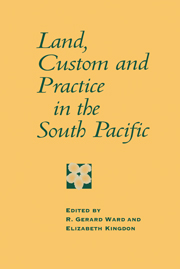Book contents
- Frontmatter
- Contents
- List of Figures
- List of Tables
- Contributors
- Acknowledgements
- Introduction
- 1 Land Use and Tenure: Some Comparisons
- 2 Land Tenure in the Pacific Islands
- 3 Breathing Spaces: Customary Land Tenure in Vanuatu
- 4 From Corporate to Individual Land Tenure in Western Samoa
- 5 Right and Privilege in Tongan Land Tenure
- 6 Land, Law and Custom: Diverging Realities in Fiji
- 7 Beyond the Breathing Space
- Bibliography
- Index
5 - Right and Privilege in Tongan Land Tenure
Published online by Cambridge University Press: 10 November 2009
- Frontmatter
- Contents
- List of Figures
- List of Tables
- Contributors
- Acknowledgements
- Introduction
- 1 Land Use and Tenure: Some Comparisons
- 2 Land Tenure in the Pacific Islands
- 3 Breathing Spaces: Customary Land Tenure in Vanuatu
- 4 From Corporate to Individual Land Tenure in Western Samoa
- 5 Right and Privilege in Tongan Land Tenure
- 6 Land, Law and Custom: Diverging Realities in Fiji
- 7 Beyond the Breathing Space
- Bibliography
- Index
Summary
In the closing decades of the nineteenth century, as international rivalries and ambitions drew the whole South Pacific into a web of protectorates and annexations by European colonial powers, Tonga proclaimed its own written constitution and declared itself an independent monarchy (Figure 5.1). This move set the nation on an historical course quite different from its neighbours. Tonga was never colonised. Furthermore, the first monarch, Tupou I, in order to consolidate his authority and lessen the power of strong rival chiefs, instituted reforms which gave all males individual rights to land. Tongan commoners were set free ‘from serfdom, and all vassalage’ and the other powers Tongan chiefs had over their people's lives and property; instead, chiefs were told to ‘allot portions of land to the people’ (quoted from the 1862 Code of Laws by Lātūkefu, 1975:34–5).
Elsewhere in the Pacific, land rights underwent changes which clearly reflected outside interests. Colonial governments rapidly established a distinction between freehold and customary or native title. This duality involved a further contrast between individual alienable rights, which were taken up by settlers and commercial interests, and communal, inalienable rights intended to protect the integrity of the ‘native society’ and the livelihood of the indigenous population. The Tongan constitution of 1875 allowed no such dualities. No land was alienated to outsiders and customary rights were superseded. All land became the property of the Crown and was divided into royal, government, and noble estates. From these estates, all adult men were entitled to the permanent hereditary usufruct of an individual holding of garden land, known as a tax allotment ('api tukuhau), and a smaller house site, known as a town allotment ('api kolo).
- Type
- Chapter
- Information
- Land, Custom and Practice in the South Pacific , pp. 157 - 197Publisher: Cambridge University PressPrint publication year: 1995

